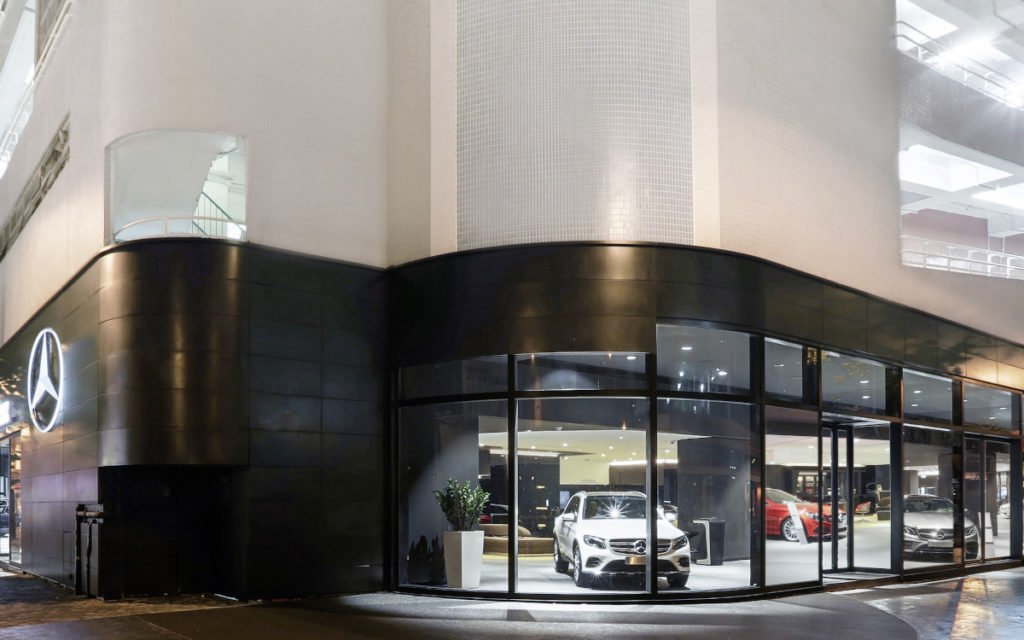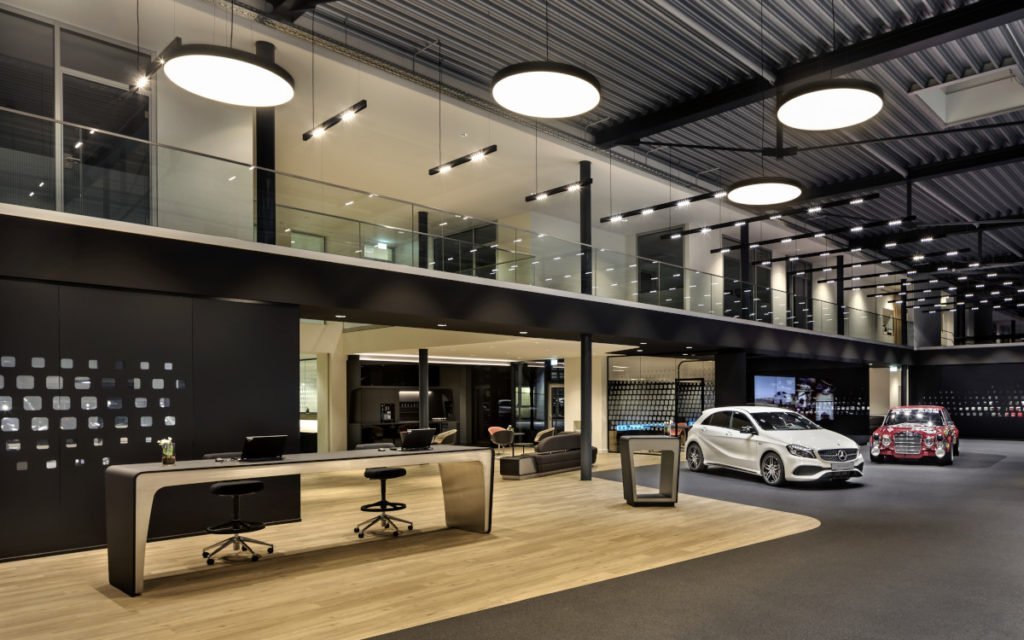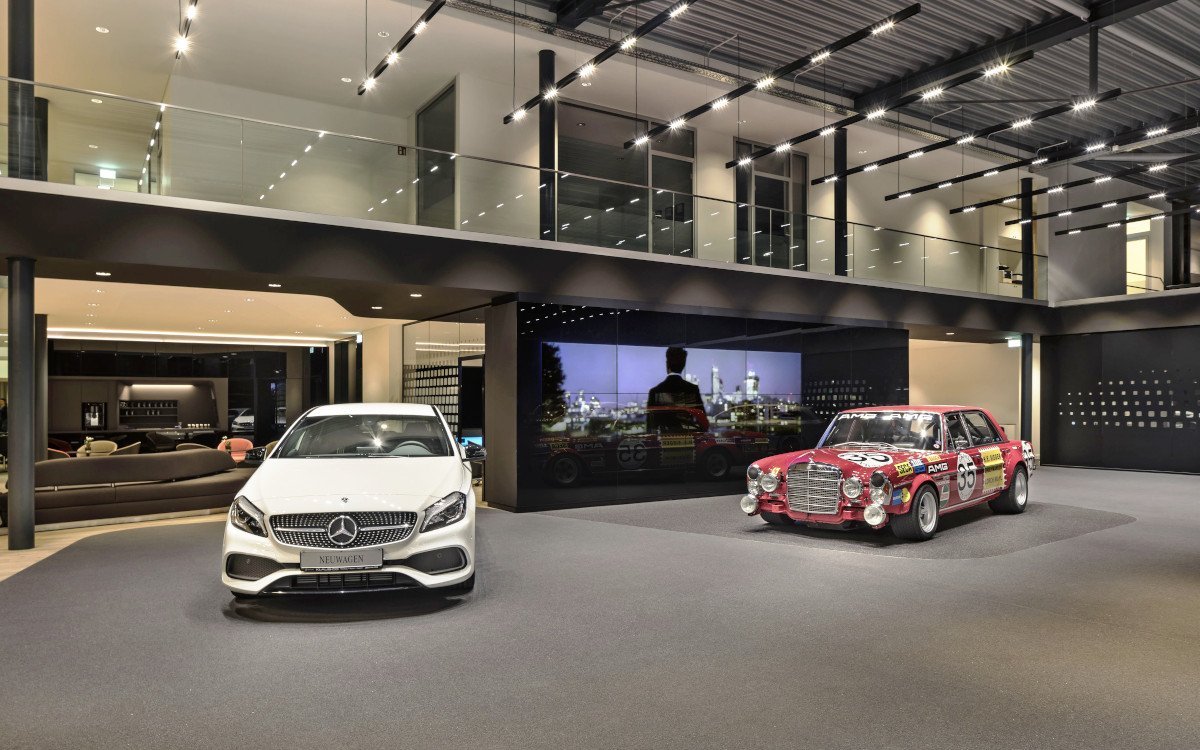New automotive platforms for e-vehicles, increasing digitalization and rapidly changing customer needs: Three reasons why car dealerships need new concepts. Daimler therefore developed a modular, multimedial and cross-brand showroom.
The traditional showroom must evolve – in response to technical progress in general and to customers in particular. This is why Daimler has been working on a new brand appearance since 2015. Now it is in place, the „2020 Retail brand identity“, MAR2020 for short. The goal: a modern, stylish and representative car dealership that creates a younger image for the Daimler core brand Mercedes-Benz. For the first time, a marketplace concept was created that does justice to Mercedes-Benz as well as Smart, Maybach and AMG. After all, the showroom of the future has to work across all brands – and Daimler’s passenger car division has a particularly wide range of vehicles, from the subcompact Smart to the Maybach luxury sedan.
Various aspects have been incorporated into the concept: for example, decades of experience of the hundreds of Mercedes Benz dealers and the group’s own branches. But in particular also the experience of the „Mercedes Me-Stores“. With Mercedes Me, the automaker has been testing new inner-city concepts in which car exhibits take a back seat since the beginning of the 2010s. Small, hip city centre locations from Hamburg to Hong Kong have become cafés with experience zones, in which only a few selected Mercedes-Benz vehicles can be found. In Moscow, for example, Mercedes Me moved into the lounge of a cinema centre, while in Beijing it was a café and two upscale restaurants. Mercedes Me is more about image building and a brand shop than a sales platform.
Digital signage supports the balancing act between sales, after-sales service, image building and event space.
However, just having brand fans does not mean that you sell cars. A new showroom concept was needed – with the best insights from Showroom and Mercedes Me.
MAR2020 was first realized near the Mercedes-Benz headquarters in Böblingen near Stuttgart. In a car dealership, individual touch points, furniture staging elements and especially the customer journey were tested over several years. Always with a couple of questions in mind: What role does digital play? How can vehicles be best presented and new technologies explained? How can the balancing act between sales, after-sales service, image-building and event space be successfully managed?
A particular challenge in the automotive retail sector is the sales structure. Generally, independent dealers and importers operate the showrooms. For the most part, they work economically independently and therefore on their own account. The headquarters in Stuttgart can therefore only make recommendations and must convince the partners of the large investments. It is not possible to simply force the partners.
Digital 3D test store with live data
In the Böblingen test store, many things have been tried out in recent years to find the ideal concept. Retail analytics systems provided by the Swedish company Modcam were of great help. Daimler’s Mercedes-Benz-Consulting department developed a digital 3D copy of the store with partners, used it to analyze the movements and interactions of the test store customers and presented them in a clear and understandable way.
Experiences with WoW effects and technology introductions are becoming more important for all-
electric vehicles.
For this purpose, a 3D model, which had never before been realized in the automotive industry, was created into which the live data was imported and effects on customer journeys could be simulated. ICT AG was part of this development as digital partner of Daimler.
Mercedes-Benz partners can choose between two versions of MAR2020:
■ the premium version (central technology with crossbar – any content source can be played on any digital touchpoint)
■ the basic version (same touchpoint concepts, only often smaller and with decentralized
technology in the staging elements
The Basic version is by far the most popular digital configuration, while the Premium version is only deployed in top locations and multi-storey car dealerships. Carolin Neumahr of ICT explained to invidis how important the role as digital development partner was: among other things due to the complex heat tests for all touchpoints as well as the unrestricted operation which had to be proven by an expert opinion.
The digital touchpoint catalogue comprises several dozen components. The most important touchpoints of MAR 2020 are:
■ Stagewall (LCD-Videowall)
■ Consultation room (Multibrand consultation room)
■ Consultation high table (information displays behind black glass)
■ Shop furnishing with and without touch displays
A stage wall comprises 18 displays on the main stage for highlight vehicles – arranged in landscape format, 6 x 3. Larger showrooms have additional sub-stages with smaller video walls. Also new are stage walls in the vehicle handover area, which will become increasingly important in the Customer Journey in the future. Experiences with WoW effects and technology introductions are becoming more important for all-electric vehicles. In general, Mercedes-Benz uses a widescreen format of 32:9 for video wall content.
Customizable consultation rooms with brand CI
Customer service is also changing. Up to now, the customer sat with the salesperson at a desk in the public area of the car dealership. Now these discussions take place in a separate room equipped with a display for configuration and a brand screen. Now, each consultation room can be brand-specifically styled at the push of a button. The respective brand logo appears on the LCD and brand-specific LED light creates ambience. Interaction with the configuration is via a tablet; the customer can follow it on the screen. In addition, the concept includes open consultation zones – similar to huddle corners with a high table and a display behind glass. Further digital signage installations are located in the shop and the aftersales areas.
Mercedes-Benz has opted for LC displays and against LEDs for all digital touchpoints. On the one hand because LCDs generate less heat, use less energy and require less maintenance. On the other hand, because of the lower investment costs.
NEC Displays won a tender to become the preferred worldwide display partner. In theory, however, dealers are free to use other hardware. However, it is highly likely that the furniture and thermal concepts will no longer fit in this case. For the Digital Signage CMS there is no real choice. With the existing Scala infrastructure comprising content servers at Mercedes-Benz headquarters and client licenses at the dealerships, continuity is paramount. Replacing the existing licenses would have been too costly.
Econocom, the French leasing and IT group, was chosen as the general contractor for the rollout of MAR2020 in a global tender. After Accenture Digital, this is already the second digital signage project that Mercedes-Benz has awarded to an international professional service organization rather than to a DS specialist. But Econocom is not the monopolist for the project. Dealers and importers can choose their own digital signage partners for the installation. In practice, there are always several integrators in larger markets, for Mercedes-Benz dealers and importers to choose from. In Germany, in addition to ICT, Mevis and Econocom are also listed as partners.
Rollout: Each project a challenge
For ICT, after many years as a development partner, the stress of daily rollout business has now begun. ICT has already retrofitted 30 car dealerships, primarily in Germany and neighboring countries. Generally, ICT relies on its own teams. „The big wave of rollouts will now hit in the coming months. We are well prepared for it and, thanks to the project experience of the past one and a half years with MAR2020, we have a strong expert team of planners, project managers, technicians and programmers on board,“ says Carolin Neumahr. „But with project planning, we always have to react at very short notice. Media technology is always the last task. Especially with new buildings, there is a risk of construction-related delays, which we often have to deal with as the last link in the chain“.

Because the dealers are independent, the worldwide rollout cannot be managed in one. The integrators plan demand in the best possible way. The head office acts as the concept provider, while architects adapt the concepts and support the dealers. This way, a viable customer journey can be created in every showroom. This is one of the major challenges – not only at Mercedes-Benz, but for all showroom concepts of car manufacturers. Car showrooms can be used in a very flexible way, the number and positioning of the car models on display changes frequently. Digital touchpoints usually have a fixed position and are therefore often suboptimally located when the customer journey changes. Headquarter influence is very limited in this regard.

Modern automotive showroom concepts require flexible integrators, detailed planning and a robust partner ecosystem.
For ICT and the other integrators, every project presents new challenges: „Instead of one customer, we now have over a hundred. Every installation is different. At peak times, we are on different sites with several teams in parallel. The overall digital installation can quickly become a six-figure investment for the dealer. Between 50 and 70 displays are possible and we need up to ten installation days,“ Neumahr describes.
The Mercedes-Benz team at ICT includes thirty employees for the rollout – ten of them in project management and twenty out on the road. „But not only the rollout requires detailed planning, a large team and a robust partner ecosystem.“ After the rollout ICT will also provide support for the systems and is integrated into the Daimler ticket system as 3rd level support. „This is quite a challenge, since every dealer operates its own IT infrastructure and every installation is different,“ explains Neumahr.
Moreover, the furnishing has been completely redesigned for MAR2020. One criterion was that they should be durable and be in use for many years. In addition, the glass panels are laminated with passportouts to accommodate larger displays or LEDs without major modifications. Once again, there was a long way between design and installation. In addition to the practical tests in Böblingen, which included installation, maintenance and robustness in everyday use, the design had to be optimized for mass production, storage and transport. This was where the know-how of Vizona’s shop fitting consultants, who have been managing worldwide rollouts for decades, was called upon. Isaria in Munich and Arno in Wolfschlugen build the furniture. Both companies work for many large car manufacturers worldwide.
Get full access to all invidis yearbook articles – it’s free!
Download the industry bible for more analysis and market data. Secure your personal copy now – it’s free of charge.
